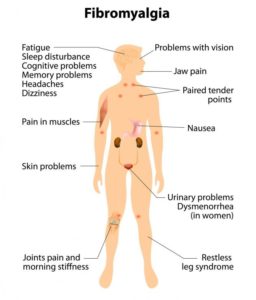What is Fibromyalgia?
This is a complex syndrome that results in chronic muscle pain. Typically, people experience widespread dull pain involving bones and muscles for greater than three months. Aside from pain, individuals complain of changes in sleepy, mood and memory patterns that affect the quality of life.
It is believed, that the processing of pain in the brain is amplified in individuals that suffer from this condition. Symptoms maybe experienced after either a physical or psychological stressor. Other individuals experience this condition without a proceeding event.
This is more common in women than men and usually these people have associated tension headaches, temporomandibular joint (TMJ) dysfunction, anxiety and depression.
Exact cause of this condition is not clear. However, it has been documented to occur after trauma, infection or in relation to psychological changes.
Potential symptoms that you may experience with this condition:
- Widespread pain
- Muscle pain, fatigue and spasms
- Memory loss and difficulty with concentration
- Fatigue
- Headaches
- TMJ Pain
- Mood changes: depression and anxiety
- Abdominal pain described as muscle cramping or irritable bowel syndromeTreatment options for condition.
Treatment Options for this condition:
- Physical therapy:
- Muscle stretching and strengthening
- Core strengthening
- Local ultrasound therapy
- Massage therapy
- Heat therapy
- Cognitive behavioral therapy (CBT)
- Regular Exercise Regimen
- Yoga
- Medications:
- Anti-inflammatory therapy
- Nerve pain medications: Neurontin, Lyrica, Amitriptyline, Nortriptyline
- Medications for anxiety and depression
- Muscle relaxants
- Interventions:
- Trigger point injections
- Acupuncture
- TENS unit therapy

